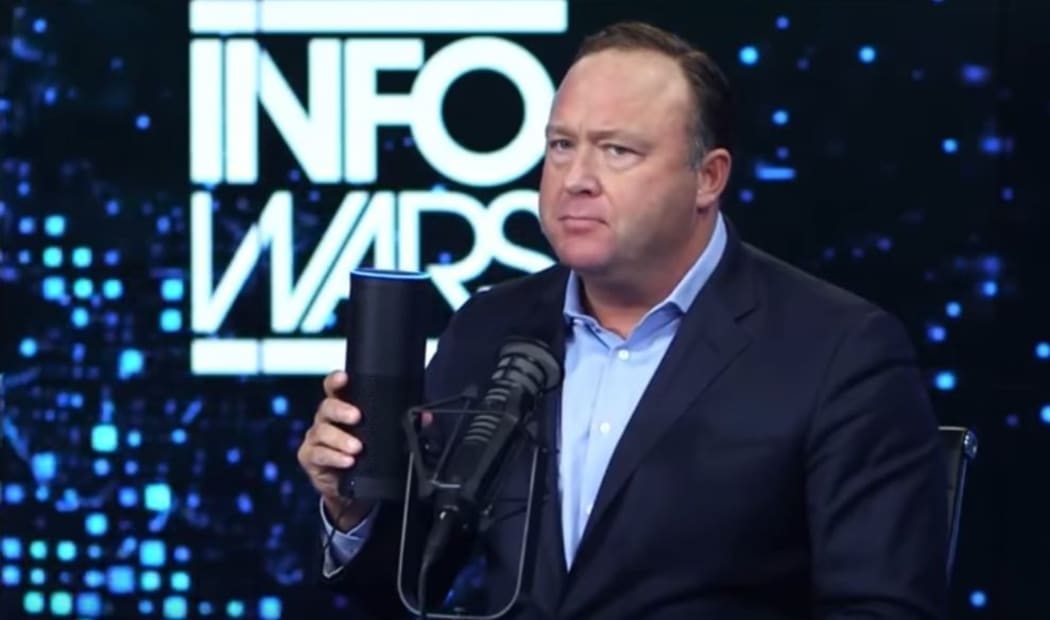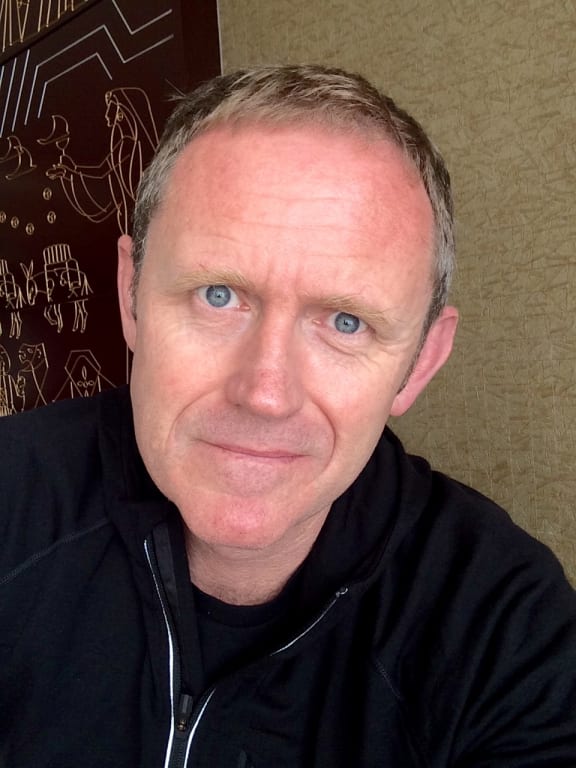Voice-activated ‘smart speakers’ now on the market mean you can get news online without lifting a finger. Our media companies are on board but will this change the nature of our news? Or will Kiwis give the hands-free habit the finger?

Alex vs Alexa: InfoWars' main man confronts Amazon's in-home online "bugging device." Photo: screenshot
Last month three of the biggest and fastest growing global tech companies - Apple, Google and Amazon - all posted further increases in their already eye-watering profits.
One of reasons was soaring sales of 'smart speakers': voice-activated devices for the home connected to the internet which make typing on keyboards or tapping on screens redundant. The devices learn from what you say and do over time while they’re online.
Smart speakers are new to the market here and haven’t been aggressively promoted yet, but our our major media companies are keen to be on every platform where there’s an audience and in the past month most of them have rolled out special services - or 'skills' - for devices on the market.
RNZ has launched an hourly news bulletin for users of Amazon's Alexa system. SKY has a skill allowing customers to ask Alexa what programmes are on, when they are on, what channel they’re on. It can also check a channel and see SKY’s 'Picks of the Day'.
TVNZ says 1 NEWS will have twice daily updates on the Amazon devices and Stuff.co.nz announced a daily 'flash briefing' called One Minute of Stuff which it describes as ”a summary of the best stories from our nationwide network of journalists, mixing news of national significance with quirky local gems.”
NZME says its latest news through The New Zealand Herald and Newstalk ZB and ZM music and podcast content will be available by voice from Alexa too.
But with only a handful of the devices in use here, why bother?

Laura Maxwell, NZME's chief digital officer. Photo: supplied / NZME
"We want to be one of the chosen few that you use to curate your own content. The ability to listen to audio when you want it is already there - via podcasts, websites and apps. We need to look at the right channels to communicate news," Laura Maxwell Chief Digital Officer at NZME told Mediawatch.
"When news breaks it goes via live radio and digital. For a fuller story it's longer formats - video, written text or podcasts. Now you can multitask and listen without using your hands to activate that content," she said.
Laura Maxwell is also chair of the Interactive Advertising Bureau, a director of the Newspapers Publishers Association and a board member of The Radio Bureau, an outfit representing commercial radio industry. She reckons 'voice' tech will change news gathering across the media in the future.
"At the moment it's mostly national news but we want to look at using this to meet the objectives of Kiwis who want to know what's happening in Dunedin right down to their child's sports game that afternoon. Voice gives us the potential to provide hyperlocal content for news and sports and updates. Some of that is data content that can be adapted - so you don't need to pay as many journalists to provide that, but you can use those journalists to produce other content," Laura Maxwell said.
"Time Spent Listening" is a key measure for the radio industry. If smart speakers become the playback device of audio, as well as the main means of connecting with your computers, doesn't that mean users will be constantly interrupting the content they have requested?
"People are terrified about what it might mean, but there are positives as well," she said.

Vaughn Davis, owner and creative director of ad agency The Goat Farm Photo: supplied
Vaughn Davis is an early adopter with three of smart speakers in his home. He uses them for work at his ad agency the Goat Farm and for his weekly Radio Live show Sunday Social, all about technology and social media.
“When we look back at this point in tech history, we'll see it as the end of a brief but weird era when we slowly and clumsily typed our thoughts into mechanical and virtual keyboards, instead of just saying what we think, like we have ever since we worked out how to speak, he wrote in May 2017.
"Tappity tappity is dead. Yakkity yakkity is back," he wrote
Nice line, but in that blog post - dictated by voice and written by his phone, naturally - he also said boldly: "2017 will be the year of voice."
2017 came and went without much being heard heard about voice. Could smart speaker be a fad that never catches on here?
"Once these are in your home, your radio is no longer used and your music streaming devices aren't used. Screens are a better way of displaying information back to us, but asking with your voice is the future. Media companies can't afford not to be on them," he told Mediawatch.
"It will force newsgatherers to optimise short-form content and they will have to make it findable online for people only using their voice," he said.
Vaughn Davis uses smart speakers to dial up news audio from all over the world using his voice. One drawback, he says, is that voice searches could end up delivering information so finely targeted to individual preferences that people are insulated from other sources that may challenge them or present new ideas.
"That's not in the interests of content creators at all," he told Mediawatch.
The darker side of data
Smart speakers have been aggressively advertised overseas and tech writers have talked them but the cheerleading has drowned out warnings of a darker downside.
"If you asked people thirty of forty years ago if they would like to install a listening device in the house which is going to harvest all of your family's data, make money from it and is easily hackable - not only by your own country's intelligence agencies but others and random criminals too - no-one would do it. They would think you're crazy," Stephanie Hare from Oxford Analytica told the BBC.
"But we are living in a world now where people know that Facebook (was used for) election interference. They know there's fake news. They even know it's not good for your mental health to be on these social media networks but they keep using them. People want to have these devices too. Perhaps it's a new logic we don't yet understand," she said.
Among those spooked by all that is prime mover of the Infowars online media platform Alex Jones. Recently he confronted Amazon’s Alexa about his worries directly by asking her if she worked for the CIA.
Even among those not quite so paranoid, there genuine concerns about privacy and data harvesting in the US where smart speaker sales are rocketing.
Broadcasters don't know who's listening to a traditional radio broadcast over the air, but smart speaker users must have accounts with Amazon, Apple, Microsoft or Google (as well as a broadband account with an ISP). The online behaviour and digital watching and listening habits of users yield priceless data to the likes of Apple and Google who also want to target people as customers.
"There has always been a value exchange for content," NZME's Laura Maxwell said.
"Sometimes you pay cash, sometimes you are paying with your behaviour or data. People are quick to jump to the terrible consequences of the invasion of privacy," she said.
"But data is anonymised and we are just looking for patterns of behaviour. Media companies want to know what people are reading, and how long they are reading or watching a video. That helps us create the content people interact with. Consumers are starting to understand content is worth paying for," NZME's Laura Maxwell said.
"You could say that's creepy and evil, but if I see an ad I would rather it related to what I wanted than it being a blunt push based on what the population might want," said Vaughn Davis.

